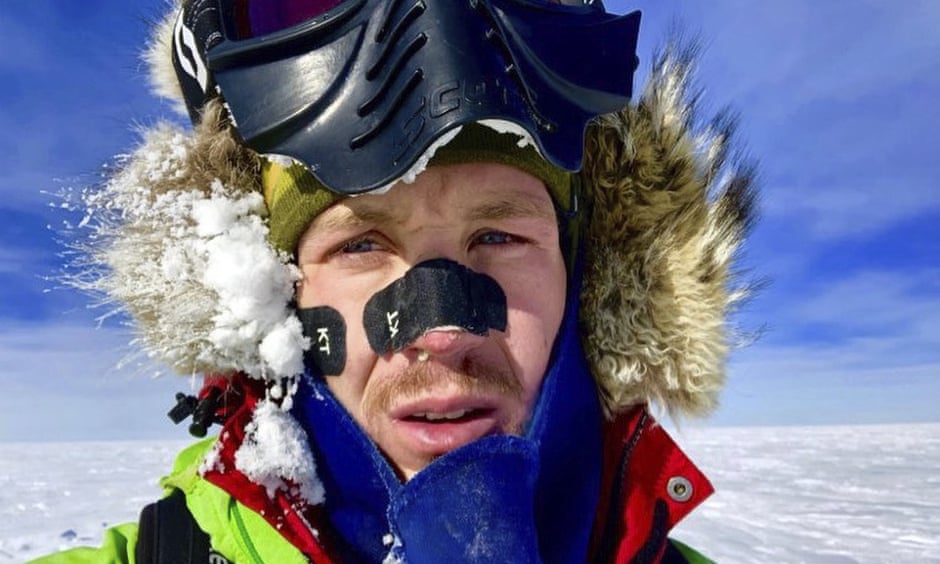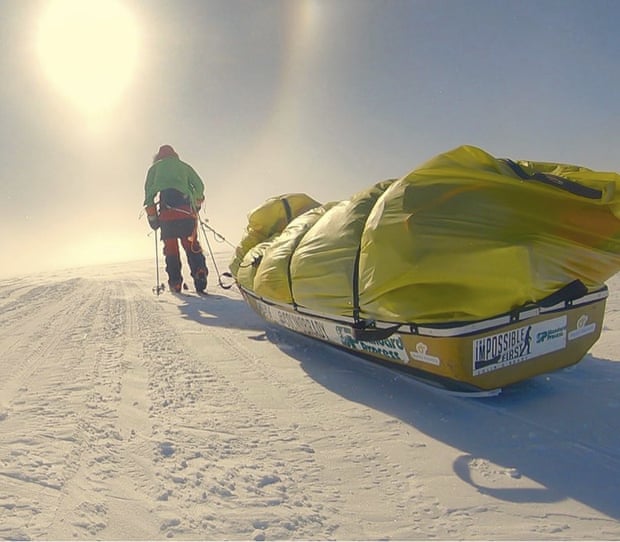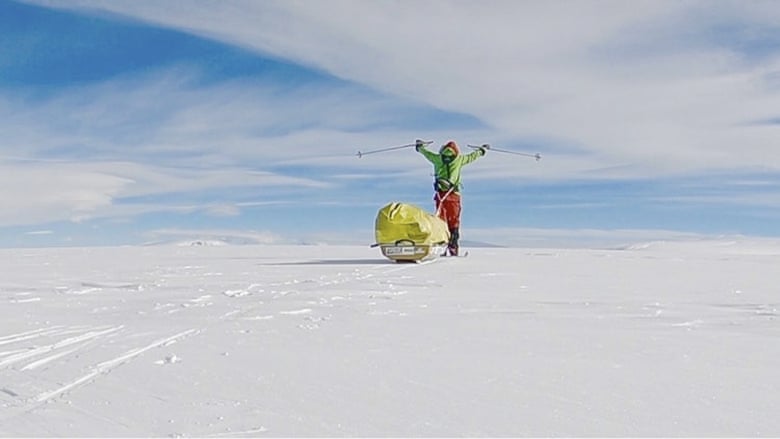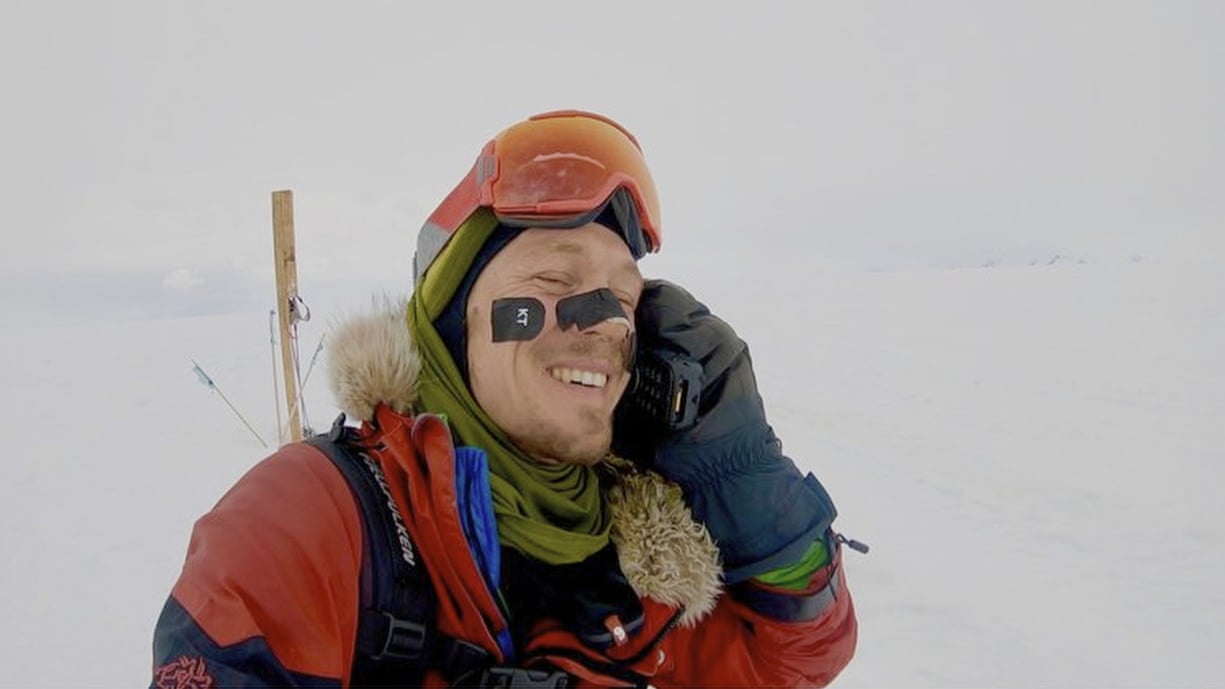Colin O’Brady with black tape on his nose and cheeks, used for insulation when frostnip sets in. Photograph: Colin O’Brady/AP
From The Guardian by Emma Graham-Harrison
Endurance athlete took 54 days to walk 932 miles across frozen continent, dragging a 170kg sled
An American explorer has made the first solo unsupported trek across Antarctica, an epic feat of endurance that took nearly two months and ended with an extraordinary sprint.
Colin O’Brady covered the final 77.54 miles over 32 hours without sleep, a trek he described as an Antarctic ultramarathon, then called his family to tell them tearfully, “I did it!”.
“Something overcame me,” O’Brady said in a telephone interview with the New York Times.
“I didn’t listen to any music – just locked in, like I’m going until I’m done.
It was profound, it was beautiful and it was an amazing way to finish.”
He had spent 54 days in conditions that pushed his body to its limit, battling hunger, cold and solitude, often trekking almost blind through driving snow, struggling over treacherous terrain and pulling weeks’ worth of supplies on a sled.
The total journey was 932 miles.
O’Brady, 33, had called his trek “the impossible first”.
In 2016, Briton Henry Worsley died after calling off the same trek only 30 miles from the end.
Another explorer gave up the quest at the south pole last year.
The two men set off together, with Rudd taking an early lead, but by Christmas Day he was more than 80 miles behind his American rival.
O’Brady decided to make a final push for the finish line on Christmas Day.
He finally stopped near midnight – but took only 90 minutes to boil water and eat a double ration of dinner.
He told Jenna Besaw, his wife and expedition manager, that he wanted to keep moving.
She and other close relatives questioned O’Brady to check that exhaustion and hunger were not affecting his mind.
“We had an open and honest and smart conversation with him,” Besaw told the New York Times.
“And he totally delivered.” He set off again into the light of an Antarctic midsummer, and reached the edge of the landmass – buried beneath ice but clearly marked – on Boxing Day.
Colin O’Brady drags his belongings across the snow. Personally tailored
nutrition bars made up about 50% of his diet.
Photograph: Colin
O’Brady/AP
One of the biggest problems for the two men was dragging enough food to keep themselves warm, and moving.
They expected to get through about 10,000 calories a day, and the length of the trip meant it was hard for them to drag enough food at the start.
O’Brady took 280 personally tailored “Colin bars”, drawn up after tests by a nutrition company looking for the smallest allergies, that supplied more than 1,100 calories each, Outside magazine reported.
They made up half his daily diet, but even so, O’Brady began wasting away, he reported on Instagram.
“I’ve lost a ton of weight,” he wrote, six weeks in.
“So much so that I am afraid to take a close look at my body.
My calves feel more like the size of my arms at this point.
My watch is starting to slide around on my wrist and I’ve had to tighten the strap.”
The cold also bit more as he got weaker; later photos show O’Brady with black tape on his nose and cheeks, used for insulation when frostnip – a warning of more dangerous frostbite – set in.
Both men also had to resist temptation when they reached the south pole, where there is a small scientific station.
If they had gone inside, or accepted even a cup of tea from the team working there, their trip would no longer have been considered unsupported.
Other explorers have made the journey across Antarctica alone, but using food supplies dropped along the route for them to collect, or with giant kites that helped them harness the power of the polar winds to cross the continent.
O’Brady lugged his supplies on a sled as he skied in bone-chilling temperatures.
Photograph: Colin O’Brady/AP
O’Brady was the first to make the journey using only the power of his muscles; Rudd, if he completes the trip, will be the second.
For all the intense hardships, O’Brady also celebrated moments of joy and beauty, including sightings of a circular rainbow “glistening overhead”, he wrote.
“It was stunning. I’ve only ever seen this phenomenon in Antarctica and I’m curious why it happens.”
Colin O’Brady speaks
on the phone in Antarctica.
He covered the final 77.54 miles of his
trek over 32 hours without sleep.
Photograph: Colin O’Brady/AP
He also got a call from the American musician Paul Simon, who had heard that his album Graceland was helping O’Brady make it through the long days and shared his number with the explorer’s support team.
The two men talked about creativity and commitment.
“Though his expression is music and mine endurance sport, we both could relate so much on the mindset required to attempt to perform at that level,” O’Brady wrote.
With his trip finished, he was looking forward to sleeping.
He plans to wait until Rudd catches up with him so the two men can fly out together.
“I’m delirious writing this as I haven’t slept yet,” O’Brady wrote in a final post.
Quoting Nelson Mandela, he said: “It always seems impossible until it’s done.”
Links :
- Business Insider : A 33-year-old American just became the first person to cross ... / An American explorer is trekking across Antarctica alone with only one ...
- WP : This man just crossed Antarctica alone — and in record time
- NYTimes : Colin O'Brady Completes Crossing of Antarctica With Final 32-Hour ... / How We're Covering the Race at the Bottom of the World
- CNN : American endurance athlete becomes the first person to cross ...







No comments:
Post a Comment